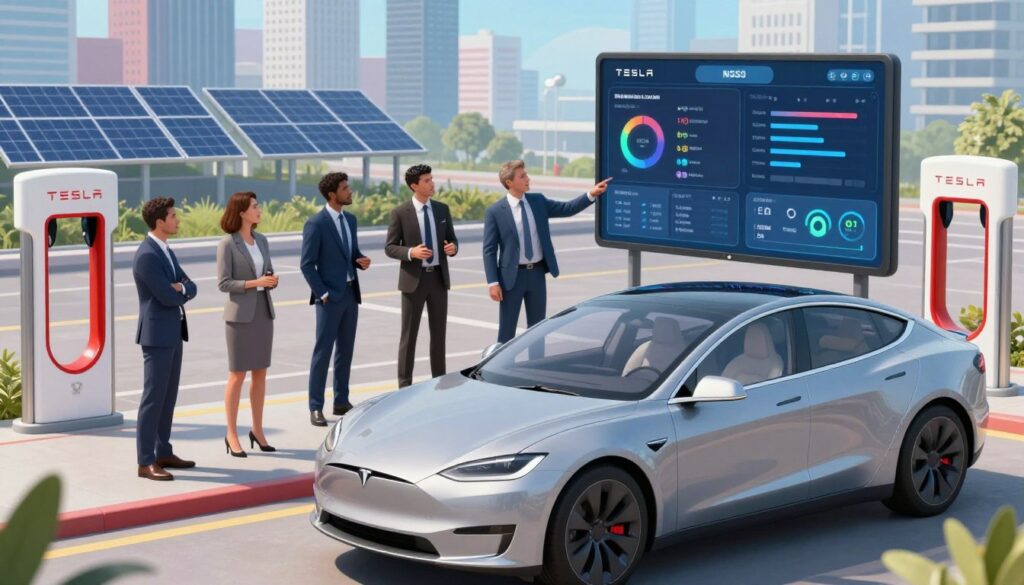Is your business finding it hard to keep up with the digital world? Marketing automation could be the answer. It’s changing how businesses connect with customers and grow. With over 90% of top marketers saying it’s key to success, it’s time to see how it can change your business.

Marketing automation uses software to handle routine tasks. This lets your team focus on creative ideas and strategy. By using these tools, businesses can cut marketing costs by 12.2% and boost sales by 14.5%. It helps in sending out emails and nurturing leads, making customer experiences more personal and engaging.
Marketing automation does more than just save time. It helps businesses find 20% more sales opportunities on average. This is because it makes responding to leads faster. Businesses that answer quickly are seven times more likely to turn leads into customers. It ensures no lead is missed.
Getting into marketing automation is not just about following trends. It’s about growing your business for the long term. Almost 50% of companies see a return on their investment in 2 to 6 months, and 76% within a year. Whether you’re small or big, marketing automation has solutions for you.
Using marketing automation software is essential for optimizing your business operations. Platforms like AI Arkitechs enable you to automate tasks, improve efficiency, and drive better results. By streamlining processes, you can focus on growing your business while ensuring every marketing effort is impactful.
Key Takeaways
- Marketing automation is vital for business success in the digital age
- It reduces costs and increases productivity significantly
- Personalization at scale drives customer engagement
- Faster lead response times lead to higher qualification rates
- ROI is typically realized within the first year of implementation
- Solutions are available for businesses of all sizes and budgets
Understanding Marketing Automation and Its Benefits
Marketing automation software changes how businesses connect with customers. It makes tasks easier, so companies can grow and plan better.
Definition and Core Components Marketing automation combines different digital marketing tools into one system. It includes email marketing, social media planning, and managing customer data. These parts work together to give customers a smooth, personal experience.
We’ve seen how effective marketing solutions can revolutionize the way businesses operate. From automating tasks to optimizing campaigns, we focus on strategies that save time, improve efficiency, and deliver real results for our clients.
Key Features of Marketing Automation
The main features of marketing automation are:
- Automated email campaigns
- Lead scoring and nurturing
- Customer segmentation
- Analytics and reporting
- Multi-channel marketing
These features help businesses send targeted messages on social media, search ads, and email.
Impact on Business Operations
Marketing automation greatly improves business results. Companies using it see a 53% boost in conversion rates and a 34% rise in average revenue. It also increases sales by 14.5% and cuts marketing costs by 12.2%.
| Metric | Improvement |
|---|---|
| Conversion Rates | 53% increase |
| Average Revenue | 34% increase |
| Sales Productivity | 14.5% increase |
| Marketing Overhead | 12.2% reduction |
By automating tasks, marketing teams can plan better and engage customers more. This leads to better lead nurturing and higher ROI. In fact, 75% of companies see an increase in ROI within a year.
The ROI of Marketing Automation Investment
Marketing automation brings big returns, making it key for businesses wanting to grow. Companies using these tools see quick and big benefits.
Cost Reduction and Time Savings
Automation makes marketing smoother, cutting costs and saving time. Most companies get their money back in six months. They make $5.44 for every dollar spent on marketing automation.
Revenue Growth Statistics
Marketing automation boosts sales and keeps customers coming back. An email marketing program can bring in $30,000 in a month. Companies see an ROI of 10% to 20%, making $0.10 to $0.20 for every dollar invested.
Productivity Improvements
Automation makes work easier by cutting down on manual tasks and mistakes. It lets businesses send personalized messages to many people, with 48% of marketers saying it strengthens customer ties. Tools like automated emails and surveys keep customers engaged without extra work.
Marketing automation helps businesses work better, get more from their marketing, and grow their sales. The numbers prove that using automation is a smart move for businesses aiming to succeed.
Essential Marketing Automation Tools for Modern Businesses
In today’s digital world, automation tools are key for businesses to improve their marketing. With 91% of companies seeing marketing automation as vital, it’s clear these tools are changing how businesses work.
Marketing automation platforms have many important features. They help with lead capture, scoring, nurturing, and managing campaigns. Over 70% of marketers say automation has made their work more efficient and effective.
- Email automation systems
- Social media scheduling platforms
- CRM software
- Analytics tools
Digital marketing services vary from simple, free tools to full-featured solutions. When picking tools, businesses should think about their needs, budget, and how well the tools work together.
The effects of these tools are big. Companies using marketing automation see an 80% boost in lead generation. They also get up to 50% more leads at 33% less cost per lead.
| Tool Type | Function | Impact |
|---|---|---|
| Email Automation | Personalized messaging | 320% more revenue than non-automated emails |
| CRM Software | Lead management | Improved sales-marketing alignment |
| Analytics Tools | Performance tracking | Data-driven decision making |
By using these automation tools, businesses can free up employees to focus on important tasks. This boosts productivity and helps businesses grow in the digital world.
Streamlining Email Marketing Campaigns
Email marketing automation changes how businesses talk to customers. It lets them send personalized messages to many people at once. This boosts engagement and sales. Let’s see how it changes email campaigns.
Personalization at Scale
Personalized emails get better results. They can increase engagement by up to 26% and sales by 6 times. Automation lets businesses send messages that match what each customer likes and buys. This can make email marketing 760% more profitable.
Automated Email Sequences
Automated email sequences keep people interested without needing to do it all by hand. Emails that start when something happens can be 119% more effective than regular ones. Emails about abandoned carts can get back 10% to 15% of lost sales. Drip campaigns can also increase email engagement by 50%. These automated emails make sure customers get messages that are just right for them at the right time.
Performance Tracking and Analytics
Tracking your email’s performance is key to making it better. Marketers who use analytics can see a 122% boost in ROI. Important things to watch include how many people open your emails (21.33% on average), how many click on links (around 2.62%), and how many buy something. By checking these numbers often, you can keep making your email strategy better and get better results.
Email marketing automation can give you a big return on investment, $42 for every $1 spent. By using personalized emails, automated sequences, and data to guide your decisions, businesses can really improve how they connect with customers. This can lead to more engagement and growth through email marketing.
Lead Generation and Nurturing Strategies
Marketing automation changes the game for lead generation and nurturing. It lets businesses quickly respond to potential customers. This can be when someone fills out a form or downloads content.
Automated lead nurturing has a big impact. Top companies see a 50% increase in sales-ready leads at a 33% lower cost. These leads also make 47% bigger purchases than those not nurtured.
Personalization is key in lead nurturing. Automation can boost sales opportunities by up to 20%. Using behavior or engagement for segmentation can raise email open rates by up to 29%.
Automated lead scoring is a big win. It can increase lead-to-customer conversion rates by up to 300%. This ensures the right leads get timely attention, possibly boosting conversion rates by up to 47%.
| Strategy | Impact |
|---|---|
| Automated Lead Nurturing | 50% more sales-ready leads at 33% lower cost |
| Personalization | Up to 20% increase in sales opportunities |
| Segmentation | Up to 29% improvement in email open rates |
| Automated Lead Scoring | Up to 300% improvement in lead-to-customer conversion rates |
By using these strategies, businesses can make their customer journey better. They can improve lead generation and nurturing. This leads to a more efficient sales process and better marketing ROI. Businesses using automation for lead tracking and engagement see a 46% improvement.
Customer Relationship Management Integration
CRM integration is key for modern businesses wanting to improve customer relationships and make operations smoother. It combines CRM systems with marketing automation. This way, companies can see a complete picture of customer data and interactions at all touchpoints.
Data Synchronization
It’s vital to sync CRM and marketing automation data well. This makes sure all departments have the latest customer info. Businesses that do this right can see a 20% to 30% growth in business.
Customer Journey Mapping
With integrated systems, businesses can map the customer journey better. This gives a clear view of customer behavior and preferences at every stage. Personalized marketing content from CRM and marketing automation boosts customer engagement and keeps them coming back.
Automated Follow-ups
CRM integration makes it easy to set up automated follow-ups. These timely messages can greatly increase customer engagement and conversion rates. Marketing automation helps tailor content to each lead’s behavior, making the buying journey more personal.
| CRM Integration Benefits | Impact |
|---|---|
| Data Synchronization | 20-30% business growth |
| Customer Journey Mapping | Enhanced engagement and retention |
| Automated Follow-ups | Improved lead nurturing and personalization |
By using CRM integration, businesses can offer a more unified customer experience. This leads to happier customers and more loyalty. This approach not only makes operations more efficient but also gives valuable insights for better marketing and sales strategies.
Social Media Automation Best Practices
Social media automation has changed how businesses handle their online presence. It helps companies engage more and save time. With automation tools, brands can manage up to 10 accounts at once, sharing more content.
Content scheduling is key for good social marketing. Posting regularly through automation can boost engagement by up to 50%. This shows the power of posting at the right time. Posts shared at the best times get 32% more engagement, showing timing is crucial.
It’s important to track how well your social media is doing. Automated reports help businesses see how they’re doing. This can lead to a 20% increase in conversions. Regularly checking your social media’s performance can also boost your ROI by 15% to 25%.
- Use chatbots to handle up to 80% of repetitive customer inquiries
- Implement social listening tools to boost customer engagement by 40%
- Integrate social media automation with email marketing for 50% higher cross-channel engagement
By following these tips, businesses can get the most out of social media automation. Companies that automate their social media marketing save up to 6 hours a week. They also see a 27% increase in lead generation. This lets marketers create better content and connect with their audience more.
Analytics and Performance Tracking Solutions
In today’s digital world, marketing analytics and tracking are key to success. They give insights into how well campaigns work and what customers do. This helps in making marketing plans based on data.
Check our latest video to optimize marketing automation: https://www.instagram.com/p/DDvMTjxhxek/
Key Performance Indicators
KPIs are important metrics for measuring marketing success. Companies using marketing automation see a big jump in qualified leads. These leads also spend more than those not nurtured. Some key KPIs include:
- Conversion rates
- Customer acquisition costs
- Customer lifetime value
- Click-through rates
Data-Driven Decision Making
Marketing automation helps build detailed profiles of prospects and use big data well. This approach leads to better targeted campaigns and higher success rates. For example, Dell saw a huge jump in click-through rates and conversions by using customer web history in ads.

ROI Measurement Tools
Measuring ROI is key for improving marketing strategies. Salesforce customers saw a 25% boost in marketing ROI after using CRM. Marketing automation helps use marketing budget better, leading to quicker qualified lead generation. Also, campaigns with automated analytics can track the buying cycle accurately.
Data is the fuel that powers effective marketing strategies. Without proper analytics and performance tracking, businesses are basically flying blind.
Despite the benefits, 87% of marketers think data is under-used. This shows the need for strong analytics and tracking solutions to compete in today’s data-driven market.
| Metric | Impact |
|---|---|
| Sales Productivity Increase | 14.5% |
| Marketing Overhead Reduction | 12.2% |
| Increase in Qualified Leads | 451% |
| Average Increase in Marketing ROI | 25% |
Implementing Marketing Automation in Small Businesses
Marketing automation can change how your business markets itself. Many companies see a 14.5% increase in sales productivity. Let’s look at how to start, manage your budget, and overcome challenges.
Getting Started Guide
Start with simple tools like email platforms or social media schedulers. Focus on tasks that make a big impact and grow slowly. This way, teams can spend up to 60% of their time on important tasks. Begin by automating tasks like email outreach and reporting.
Budget Considerations
When setting your marketing budget, think about tool costs and savings. Small businesses usually spend about 40% of their budget on marketing. But, marketing automation can cut costs by 30%. This investment is worth it, with 77% of marketers seeing more ROI from automation.
| Aspect | Impact |
|---|---|
| Time Savings | Up to 300 hours annually |
| Lead Generation | 451% increase in qualified leads |
| Conversion Rate | Up to 53% increase |
Common Implementation Challenges
Small businesses face challenges like training staff and integrating systems. Data migration can be tricky. To overcome these, start small and grow gradually. Remember, 70% of small-to-medium businesses say automation helps them grow without needing more staff.
By tackling these issues, small businesses can use marketing automation to improve efficiency and grow. With the right approach, companies can see revenue go up by over 10% in 6-9 months.
Advanced Marketing Automation Features
Marketing automation software has grown to include top-notch features. These tools use AI to offer personalized experiences to many people.
Predictive analytics is a big change in marketing. It looks at past customer actions to guess what they might want next. This helps businesses get 451% more qualified leads.
Behavioral targeting is another key feature. It lets marketers sort their audience by what they do and like. This makes campaigns 5-10 times more effective.
AI chatbots are now a big part of customer service. They give quick answers, making interactions 20% better.
Dynamic content generation changes marketing materials on the fly. It makes 78% of people more likely to buy when they see content that fits them.
Automated A/B testing keeps improving campaigns. It helps marketers make their strategies better with ease. This makes 82% of marketers more efficient.
| Feature | Impact |
|---|---|
| Predictive Analytics | 451% increase in qualified leads |
| Behavioral Targeting | 5-10x higher conversion rates |
| AI Chatbots | 20% increase in engagement |
| Dynamic Content | 78% increase in purchase intent |
These advanced features help businesses make 10% more money in 6-9 months. As AI and machine learning get better, we’ll see even more advanced tools. These will make marketing automation even more powerful.
Future Trends in Marketing Automation
Marketing automation is changing fast, with AI and machine learning leading the way. Businesses need to keep up to stay ahead in this fast-changing world.
AI and Machine Learning Integration
AI and machine learning are changing marketing tech. A huge 95% of companies use AI for predictive analytics in their marketing. This makes marketing more personal and effective, improving how we connect with customers.
Emerging Technologies
New tech is shaping the future of marketing automation. Chatbots are becoming more popular, with the market expected to hit $77 million in 2022. These AI tools are changing how we talk to customers, offering quick and personalized help.
Predicted Market Developments
The market for marketing automation software is growing fast, aiming for $6.4 billion by 2024. This growth comes from the need for all-in-one platforms that make marketing and sales easier. Companies using strong omnichannel strategies are seeing big wins, with 89% of customers staying loyal compared to 33% for weaker strategies.
| Trend | Impact | Adoption Rate |
|---|---|---|
| AI-powered Analytics | Enhanced Personalization | 95% |
| Omnichannel Engagement | Improved Customer Retention | 89% |
| Mobile Marketing Automation | Expanded Reach | >50% of internet traffic |
Looking ahead, mobile marketing automation will play a big role. Already, over 50% of internet traffic comes from mobile users. This shows how crucial it is to make marketing work well on mobile to reach and engage people in today’s digital world.
Conclusion
Marketing automation has changed the game for businesses wanting to succeed online. It makes operations smoother and boosts productivity. This leads to better marketing results.
It can make teams up to 20% more productive and improve conversion rates by about 53%. This makes marketing automation a key tool for growth.
Marketing automation does more than just make things efficient. It allows for personalized messages to reach more people. This can lead to a 300% increase in converting web visitors into leads.
Businesses using these tools see real gains in lead nurturing, keeping customers, and increasing revenue.
Starting with marketing automation can be tough, needing tech skills and money. But the benefits last. Companies see a 10% increase in customer value and a 14.5% boost in sales productivity.
Looking ahead, businesses that use marketing automation will stay ahead. They’ll drive lasting growth in a changing market.
Need Help?
Ready to take your marketing to the next level? Let us show you how marketing automation can streamline your processes, save time, and drive meaningful growth for your business. Contact us today and start thriving with smarter marketing solutions!
FAQ
What is marketing automation?
Marketing automation uses software to do tasks that humans used to do. This includes email marketing, lead nurturing, and managing customer relationships. It makes businesses more responsive to customers, building trust over time.
FAQ
What is marketing automation?
Marketing automation uses software to do tasks that humans used to do. This includes email marketing, lead nurturing, and managing customer relationships. It makes businesses more responsive to customers, building trust over time.
What are the key benefits of marketing automation?
FAQ
What is marketing automation?
Marketing automation uses software to do tasks that humans used to do. This includes email marketing, lead nurturing, and managing customer relationships. It makes businesses more responsive to customers, building trust over time.
FAQ
What is marketing automation?
Marketing automation uses software to do tasks that humans used to do. This includes email marketing, lead nurturing, and managing customer relationships. It makes businesses more responsive to customers, building trust over time.
FAQ
What is marketing automation?
Marketing automation uses software to do tasks that humans used to do. This includes email marketing, lead nurturing, and managing customer relationships. It makes businesses more responsive to customers, building trust over time.
How quickly can businesses see a return on investment (ROI) from marketing automation?
FAQ
What is marketing automation?
Marketing automation uses software to do tasks that humans used to do. This includes email marketing, lead nurturing, and managing customer relationships. It makes businesses more responsive to customers, building trust over time.
FAQ
What is marketing automation?
Marketing automation uses software to do tasks that humans used to do. This includes email marketing, lead nurturing, and managing customer relationships. It makes businesses more responsive to customers, building trust over time.
What are some essential marketing automation tools?
FAQ
What is marketing automation?
Marketing automation uses software to do tasks that humans used to do. This includes email marketing, lead nurturing, and managing customer relationships. It makes businesses more responsive to customers, building trust over time.
FAQ
What is marketing automation?
Marketing automation uses software to do tasks that humans used to do. This includes email marketing, lead nurturing, and managing customer relationships. It makes businesses more responsive to customers, building trust over time.
How does marketing automation enhance lead generation and nurturing?
FAQ
What is marketing automation?
Marketing automation uses software to do tasks that humans used to do. This includes email marketing, lead nurturing, and managing customer relationships. It makes businesses more responsive to customers, building trust over time.
FAQ
What is marketing automation?
Marketing automation uses software to do tasks that humans used to do. This includes email marketing, lead nurturing, and managing customer relationships. It makes businesses more responsive to customers, building trust over time.
What are the best practices for social media automation?
FAQ
What is marketing automation?
Marketing automation uses software to do tasks that humans used to do. This includes email marketing, lead nurturing, and managing customer relationships. It makes businesses more responsive to customers, building trust over time.
FAQ
What is marketing automation?
Marketing automation uses software to do tasks that humans used to do. This includes email marketing, lead nurturing, and managing customer relationships. It makes businesses more responsive to customers, building trust over time.
How can small businesses implement marketing automation?
FAQ
What is marketing automation?
Marketing automation uses software to do tasks that humans used to do. This includes email marketing, lead nurturing, and managing customer relationships. It makes businesses more responsive to customers, building trust over time.
FAQ
What is marketing automation?
Marketing automation uses software to do tasks that humans used to do. This includes email marketing, lead nurturing, and managing customer relationships. It makes businesses more responsive to customers, building trust over time.
What are some advanced features of marketing automation?
FAQ
What is marketing automation?
Marketing automation uses software to do tasks that humans used to do. This includes email marketing, lead nurturing, and managing customer relationships. It makes businesses more responsive to customers, building trust over time.
FAQ
What is marketing automation?
Marketing automation uses software to do tasks that humans used to do. This includes email marketing, lead nurturing, and managing customer relationships. It makes businesses more responsive to customers, building trust over time.
What are the future trends in marketing automation?
FAQ
What is marketing automation?
Marketing automation uses software to do tasks that humans used to do. This includes email marketing, lead nurturing, and managing customer relationships. It makes businesses more responsive to customers, building trust over time.
FAQ
What is marketing automation?
Marketing automation uses software to do tasks that humans used to do. This includes email marketing, lead nurturing, and managing customer relationships. It makes businesses more responsive to customers, building trust over time.
How does marketing automation integrate with Customer Relationship Management (CRM) systems?
FAQ
What is marketing automation?
Marketing automation uses software to do tasks that humans used to do. This includes email marketing, lead nurturing, and managing customer relationships. It makes businesses more responsive to customers, building trust over time.
FAQ
What is marketing automation?
Marketing automation uses software to do tasks that humans used to do. This includes email marketing, lead nurturing, and managing customer relationships. It makes businesses more responsive to customers, building trust over time.





